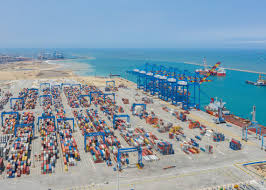
Adnan Adams Mohammed
Ghanaian exporters have reacted to the 10% tariff adjustment by the United States against all imports from Ghana highlighting a threat to Ghana-US bilateral trade relations.
The Importers and Exporters Association of Ghana indicates that the imposition of the tariffs could adversely impact the business community, particularly those involved in export activities.
The U.S current administration under President Donald Trump has in the past days embarked on tariff hikes in what he describes as trade and economic transformation in favour of the U.S economy including 14% tariffs on Nigeria, 34% tariffs on Chinese imports and a 20% tax on goods from the European Union. These measures have heightened global trade tensions and sparked mixed reactions from world leaders.
“I must say it is a big blow to the Ghanaian business community, especially the exporters,” Samson Asaki Awingobit, the Executive Secretary of the Importers and Exporters Association of Ghana noted in his reaction to the US government’s decision.
He called on the Government of Ghana to address the issue and provide solutions to mitigate the effects of the tariff.
“We believe that the Government of Ghana will definitely have to tell us something about what they are going to do to salvage the situation at this point in time,” he added.
According to the White House however, the measures are reciprocal tariffs designed to counter what the US perceives as unfair trade practices. Speaking from the Rose Garden, President Trump defended the tariffs as part of a national economic emergency, arguing that they were necessary to protect domestic manufacturing and counter decades of what he described as unfair economic practices.
Meanwhile, a veteran finance and economic journalist has waded in the debate as to the possible impact of the US tariffs adjustment, asserting that, the new condition provides double edge impact.
“To be sure, there will be negative repercussions for Ghana, a country that now exports somewhere between US$2.4 billion and US$2.7 billion to the United States annually. However, the public reaction by many trade analysts and economic commentators has been completely over the top – yes there will be some degree of threat to the country’s foreign exchange earnings and even more definitely, there will be some job losses, but altogether, the new situation is not a major threat to the Ghanaian economy.
“Indeed, properly handled it may present major opportunities.”
He admonished that, “First of all, government should not be in any hurry to announce retaliatory tariffs immediately as they would serve little purpose. Not only does America not rank among Ghana’s top export markets, but even more importantly, Ghana maintains a healthy trade surplus with that country. Indeed, the imposition of the lowest baseline tariff on Ghana in part reflects America’s relative disinterest in dramatically changing its trade relationship with us. However an immediate, unmeasured retaliation by Ghana could serve to stoke a fire that has barely been lit.”
Again, he stressed that, “the structure of Ghana’s exports to the US means that the tariffs will not significantly reduce our export earnings from that country since the primary exports are cocoa beans and crude oil, two commodities that America direly needs.
“Indeed, the biggest threat to Ghana is the fate of the many small sized enterprises that sell all sorts of non traditional exports to that country in fragmented volumes and consequently relatively small values. While any reduction in demand for such exports would not dramatically reduce Ghana’s overall export revenues derived from America, there is the real possibility of significant job losses, especially among small enterprises whose exports to the US are their primary source of income.
“For such enterprises therefore there is the need to identify and exploit export markets in other parts of the world, which certainly exist; after all, who could have predicted, three decades ago that China would today provide Ghana with its largest export market. Besides, the African Continental Free Trade Agreement (AfCFTA) has opened the door to vastly increased exports, as well as imports, from fellow African countries on preferential terms.”
Apparently, the US Ambassador to Ghana, Virginia Evelyn Palmer, has reassured Ghanaians about the resilience of the U.S.-Ghana trade relationship, which currently exceeds US$3 billion in bilateral trade and investment. She expressed confidence that Ghana’s key exports, such as gold and gas, would remain vital to global trade and would not be significantly affected by U.S. policy shifts.
“The life-saving programmes are all to be continued. The new face partnership will maintain all of the life-saving programmes. The U.S. and Ghana have a very warm, close relationship, as you all know, and that is founded on four pillars.
“We have the historical and cultural [ties]. Also, more than US$3 billion in bilateral trade investment is one of the key pillars. There are also goods and services—gold coming from here, gas coming from here—and we have automobiles and pharmaceuticals coming from the United States.
“So, it is something that builds prosperity in all the countries. It is all to say that no matter the changes in language and no matter the change in focus, Ghana remains an important part of the United States, and we will continue to be so,” she stated.
Palmer’s remarks reinforce the enduring strength of the U.S.-Ghana partnership, even as radically new global trade policies evolve.